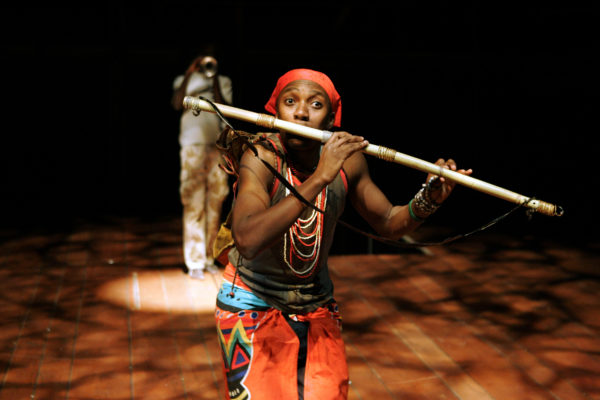Opera Review: A Decolonized “Magic Flute” by the Isango Ensemble
By Christopher Caggiano
What if you took canonical Western works and reimagined them from an African perspective?
The Magic Flute, an adaptation of Mozart’s opera performed by the Isango Ensemble. Adapted and directed by Mark Dornford-May. Presented by ArtsEmerson at the Emerson Cutler Majestic Theatre, 219 Tremont Street Boston, MA, through November 10.

Mhlekazi Andy Mosiea as Tamino in the Isango Ensemble’s production of “The Magic Flute.” Photo: Keith Pattison.
What if you took canonical Western works — i.e., the treasures of the colonizers — and reimagined them from the perspective of the colonized? That’s the intriguing premise behind the Isango Ensemble’s reinterpretation of Mozart’s opera The Magic Flute.
The South Africa-based Isango Ensemble, founded in 2000 by director Mark Dornford-May, has previously created its own subjective interpretations of Bizet’s Carmen and the Dickens classic A Christmas Carol. But the troupe really seems to have hit its stride with this recast of Mozart’s most fantastical opera.
The new African setting and treatment work quite well for The Magic Flute, transforming the otherworldly story of Tamino, Pamina, and Papageno into a sub-Saharan rite of passage for an amorous young warrior, his future queen, and his boisterous but put-upon sidekick. The overall result amounts to an exhilarating celebration of the power of music to transcend culture.
One of the most compelling aspects of Isango’s musical treatment of The Magic Flute lies with the show’s instrumentation, which consists of eight marimbas supplemented by drums, clapping rhythms, and the occasional glass bottle. Most members of the opera’s 20-strong singing ensemble also take turns as part of the marimba orchestra.
There’s something ethereal about the sound of eight marimbas — the earthy overtones, the deep vibrations. The spirited musicianship is suffused with a rich sense of rhythm and energy. It’s refreshing to hear these familiar melodies, not only imbued with the woody timbre of the marimba accompaniment, but enlivened by the haunting and crisp African harmonies in the choral sections. It’s particularly exciting to hear Mozart’s iconic overture reinvigorated as a percussion piece.
The marimba accompaniment also allows for the unamplified voices of the cast to carry throughout the theater. Even so, many of the English words were lost because of muddy diction and insufficient projection. The soloist’s voices are solid, though not quite crystalline. The acting is at times a tad stilted, the humor forced. But what the performers lack in technical prowess they more than make up for in infectious enthusiasm and good humor, particularly among the irrepressible ensemble members.
There are occasional intonation issues with the principals, most noticeably with the performer playing the Queen of the Night. (Unfortunately, the program doesn’t specify which performer is playing which role). During the Queen’s iconic vengeance aria (commonly known as “Der Hölle Rache”), the performer was consistently flat on the high notes. The show is strongest musically during the ensemble singing, which allows the rich harmonies to ring throughout the auditorium.
At times, the staging for the arias, duets, and quintets is a bit static, even amateurish. However, the staging becomes more varied in choreographer Lungelo Ngamlana’s dance numbers, which are vibrant and thrilling to the point of being downright irresistible.
If you decide to attend this Magic Flute, it might be best to brush up on the plot beforehand, even though many of the words are in English (some native South African languages are mixed in). Admittedly, I’m generally a musical theater guy and, with musicals, there’s usually no synopsis necessary. (Except for Les Miserables, which is one of my many problems with that admittedly popular work.)
Christopher Caggiano is a writer and teacher based in Boston. He serves as Associate Professor of Theater at the Boston Conservatory at Berklee. His writing has appeared in American Theatre and Dramatics magazines, and on TheaterMania.com and ZEALnyc.com.
